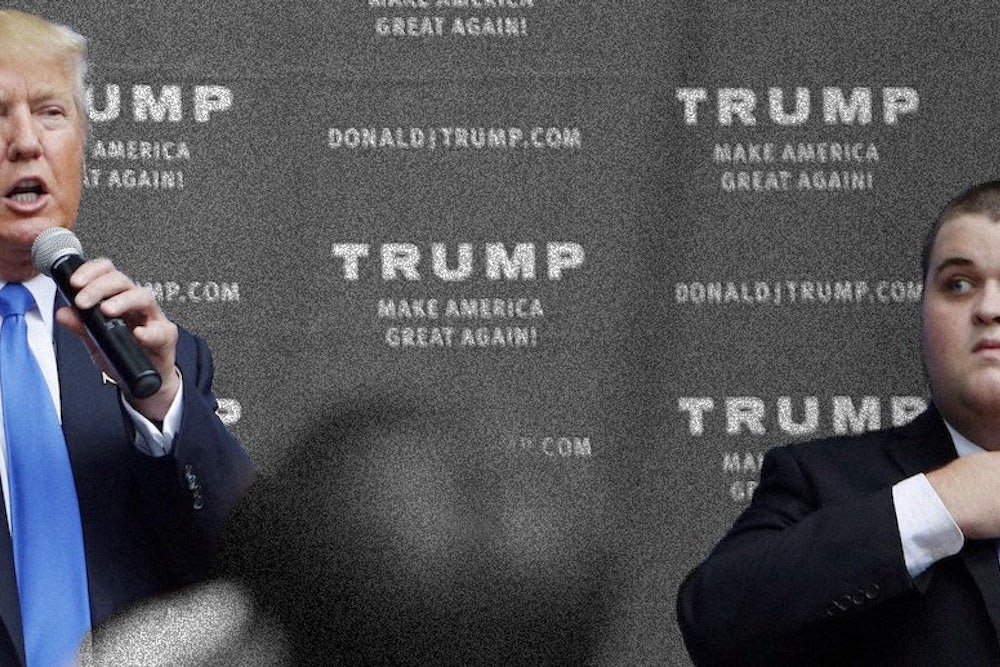Donald Trump is loud, rude, insincere; he’s already had three fake runs for president; he’s selling himself as a business genius but has declared bankruptcy four times; his three marriages have been tabloid fodder; he once suggested his daughter was so hot he’d date her if they weren’t related. His greatest success in his last fake campaign was compelling President Barack Obama to release his birth certificate, which the Obama campaign put on a commemorative T-shirt. A remark at his official campaign launch about undocumented Mexican immigrants—“They're bringing drugs. They’re bringing crime. They're rapists. And some, I assume, are good people.”—has been a catastrophe, getting Trump's beauty pageants dumped by NBC and Univision, and his ties dropped by Macy’s. Who on earth is a sincere Donald Trump supporter?
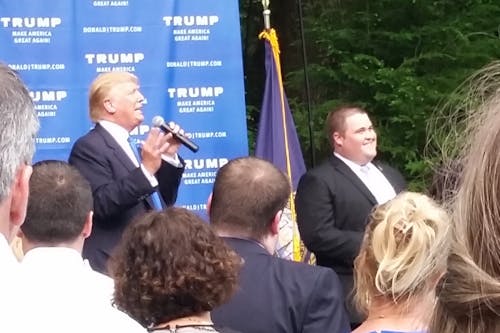
Meet Sean Van Anglen, a 22-year-old who, with a charming Rushmore-ish earnestness and seriousness, is committed to seeing Trump coat the White House in gold leaf and crystals. On Tuesday night, he hosted the candidate's first New Hampshire house party at his parents' home in Bedford, where Van Anglen also lives. Van Anglen has been a Trump disciple for more than a decade, which is a really long time if you’re 22.
As Van Anglen’s father Bill explained to the guests teetering around the backyard pool, Donald Trump taught his son how to read. When he was five years old, Van Anglen refused to learn to read. His exasperated parents eventually gave him a book by Trump. Not only did the kindergartener Van Anglen love it, it soon became the only thing he wanted to read. His teacher told his parents the kid had to read something else. But why take away a book that gave him so much joy? Van Anglen has now read all of Trump’s books and when it came time to introduce the candidate, he told the crowd how personal this cause was. “I’ve been a lifelong fan of Mr. Trump. I have always felt inspired by this man.” Trump would offer “honesty and integrity” and strength. He had a favorite Trump quote at the ready, which he shouted with not-fully-controlled excitement: “Don't put blinders on or limit yourself. Reach out, seek, and explore!”
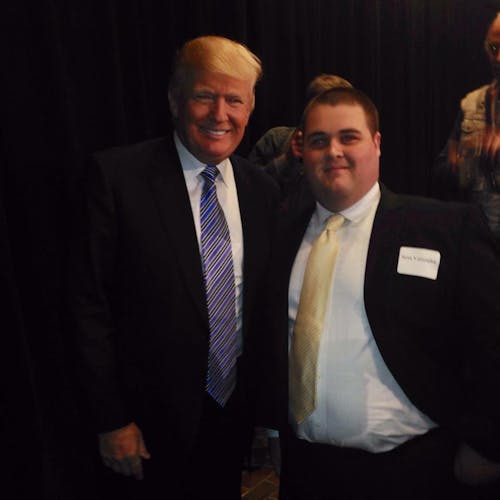
“Wow, that was very good,” said Trump, who was greeted with great applause from about 150 people. Slightly damp from rain, the celebrity had arrived with a stocky bald bodyguard and a few more slender political operatives, some poached from the conservative advocacy group Americans for Prosperity. Surveying the Van Anglen home, he explained why the event was outdoors: “You have a very big house but you don’t have that big a house.”
Watching a Trump campaign speech is like watching an episode of the HBO satire “Veep”—except the director’s commentary is turned on, and star Julia Louis-Dreyfus is the director, and she stays in character for the commentary. Trump’s speeches are equal parts parody of stump speeches, satire of political punditry, and a running meta-commentary on the gap between his public persona and his own self-image. While many politicians cite misleading statistics, Trump does away with numbers all together, and will say simply, “I have statistics!” Consider it Googled. “We’re like the stupid people,” Trump said, in the context of, I think, immigration and national debt.
He is like a standup comedian, except instead of making fun of some guy in the audience, he starts calling out reporters. (“Katie hasn’t even looked up once at me! The level of hatred is incredible,” he said about one reporter.) The crowd loved it. Everyone hates reporters but also everyone wants to see their name in the newspaper.
Trump’s popularity as a campaigner could have real consequences. Fox News has said only the top ten candidates in five recent polls will get to be on the primary debate stage. CNN made a similar rule, though there will be a second debate for the second tier. Right now, Trump could be in the main debate. “If Donald Trump elbows out Carly Fiorina, for example, that would be a real tragedy for our side,” Republican strategist Ron Bonjean told Politico. He's averaging sixth place nationally; two recent New Hampshire polls had him in second place behind Jeb Bush. Trump's analysis of the cable news commentary about this was fascinating.
I hear from the press constantly, ‘Can you imagine how sad it is that Donald Trump is in second place and he’s gonna take the place of some third-rate governor’—they don’t say the third rate—'or some third-rate senator, or some person who’s maybe lost every election they’ve ever been in except for one?’ ‘Isn’t it sad, Donald Trump?’ Who’s done more than me?! I’ve employed tens of thousands of people over my life. ...
People, they’re losers. Sleepy-eyes Chuck Todd. … Bring those CNN ratings over here, would you? Is CNN out here some place? Everybody’s here. …
I don’t think all these people are here for a lot of other people, but then I’m not supposed to be on the stage, and they are. Even though the press doesn’t even bother coming. I don’t think they even come out for other people … but they’re supposed to be on the stage? You know what? Bor-ing.
Now, this might read like Trump’s typical I’m-great-you-suck ranting. (I have trimmed this passage significantly of duplicative statements.) But it’s actually quite complex. He is acknowledging the criticism that he has not earned a place on the stage, and mocking reporters who feign sadness for democracy despite showering him with attention, and then admits the media attention is because of style not substance, but argues that that is a good thing.
Among the country club casual attendees in summery dresses and polos and not-quite-yard-proof high heels, there were two types of Trump fans. The most common type said she respects Donald Trump because he’s willing to say what he really thinks without being afraid of offending people. “He doesn’t know what ‘PC’ means,” one man told me. Of course, “willing to say what he really thinks without being afraid of offending people” actually means “willing to say what I think while offending people I don’t like.” I consider this type of fan, let's call them Trump Type I fans, to be more superficial: they are into Trump because he violates social taboos but not their own political sensibilities. The Trump Type I fans were quiet on Tuesday night when Trump said he wouldn’t cut entitlements because you can’t get elected that way.
The deeper, die-hard Trump fan, Trump Type II, believes the man has a vision that would help the country, and that he should slightly tone down his tendency to, you know, speculate about how many Mexican immigrants are rapists. Van Anglen is firmly Trump Type II. “I know people don’t think he's a serious candidate, but I can tell you from my personal standpoint he's 100 percent serious,” Van Anglen said. “I met him a number of times. We have an acquaintanceship, if you will.” Van Anglen has been hoping for Trump to run since way back in 2010 when he was a teenaged supporter of former Minnesota Gov. Tim Pawlenty. Trump, in his eyes, is a “straight shooter” who won’t be beholden to special interests because he’s too rich to be tempted by their money. And he can bring some unity to a fractured GOP: “The Republican Party is having a little bit of an issue getting along with itself, and I think Trump could be the person that brings the party together.”
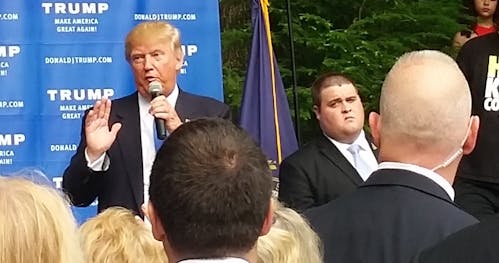
Van Anglen is a little shy, and seems to want a lot of physical personal space in conversations, because he kept backing away from me, and I was afraid my recorder wouldn’t pick up his voice. I stepped slightly toward him, and he stepped away, like I was slow-motion chasing him across his parents’ driveway. After taking time off during college to work on some political campaigns—Tim Pawlenty's, and later Mitt Romney's—he graduated last year from New England College with a degree in political science. Since graduating, he has launched “The Van Anglen Show,” a YouTube channel about cigars. He golfs, “playing the professional mini-tours in Florida.” But his love is politics, and his parents have hosted many events, but, he says of his childhood icon running for president, “this is probably the largest crowd we’ve had.”
The Van Anglen family has been heavily involved in New Hampshire Republican politics since he was born. “I did my first campaign when I was about 10 years old, when John E. Sununu was running.” The Sununus are family friends. Van Anglen humbly admitted that at 10, you can’t contribute too much to a campaign, but “I was a very helpful volunteer at that point.” At 16, he testified before the state legislature, advocating for a bill that would make home invasion murderers subject to the death penalty. Former state Rep. John Cebrowski said, “Some kids play baseball. Some kids play soccer. Sean’s into politics.” Van Anglen’s success even drew some envy. “You think he’s adorable?” gasped a blond young Republican, who was as sinisterly handsome as any teen movie bad guy.
Van Anglen (and his parents) organized the Trump house party and invited about 60 family friends to attend (the Trump campaign invited more). Well after most guests and reporters had left, he still clutched the cordless microphone he had used to introduce Trump. (When someone asked why he was still holding it, he said, “I don’t know what to do with this.”) Older adults swirled around to congratulate him on a successful event and pressed business cards into his hand. One woman was an anti-vaxxer, who combined Jenny McCarthyism with Trumpism, and asked how can we make this country great if one in six people have autism? I asked Van Anglen if he agreed with the anti-vaccine people. He gave me a spectacular non-answer, one that showed great finesse in the art of politics: “I’m not a parent. I don't have any immediate plans to be a parent. It’s important for families to gather all the information they can to educate themselves. … I support it but don’t support it.”
In 1987, about a decade before Van Anglen was born, Trump’s book The Art of the Deal was published and became a best-seller. It contained an 11-step formula for success and is the foundation of Trump’s career as a “sales motivator”—self-help but with more money. He’s like Tony Robbins mixed with Alec Baldwin’s emissary from Mitch and Murray in Glengarry Glenross. Trump’s other works include The Art of the Comeback, The Way to the Top, How to Get Rich, Think Like a Billionaire, The Best Golf Advice I Ever Received, Why We Want You to Be Rich, The Best Real Estate Advice I Ever Received, Trump 101: The Way to Success, Never Give Up, Think Like a Champion, and Midas Touch. Trump University was founded in 2005 to sell classes on getting rich; in 2011 it was renamed the Trump Entrepreneur Initiative because it didn’t actually qualify as a university. “Think of The Donald as a salesman on steroids,” Entrepreneur magazine said in 2010. “And in this lesser-recognized role, Trump practices the art of the thrill.”
All of Trump’s books have informed Van Anglen’s ambition, but he singled out one. “I just finished reading Think BIG and Kick Ass. I tell people if they’re questioning Trump, read that book. Because he does think big.” These principles have guided Van Anglen as he hustles to build a business with a “very, very expensive website” to sell cigars. He’s working his contacts in the cigar industry, some met through his gig as an unpaid ambassador for Cigar Rights for America. (Van Anglen somberly told me that as an ambassador he can endorse Trump for president, but CRA is not taking a position in the primary.) “If you want to be successful you have to think of an idea. You can’t just wait for it to come,” he said.
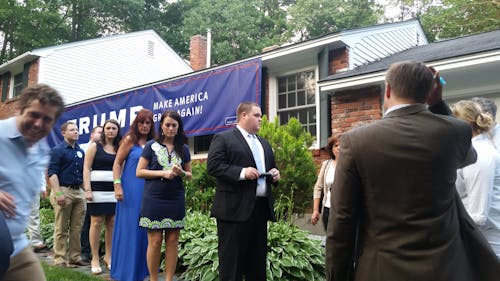
What Trump offers to Trump Type II fans is the idea that by sheer force of personality they, too, can make “big” things happen in America. “I think people today have become afraid of success and afraid of achievement, and the American Dream today—it’s really hard to define what the American Dream is,” Van Angelen says. “I firmly believe everyone starts out with a fresh slate and how they take it from there is completely up to them.”
After he spoke, Trump tried to get out of answering questions by arguing that pop stars ruin killer concerts with lame encores. But he took a few anyway, though did not pretend to enjoy it. A woman complained that her mother couldn’t get a job in New Mexico because she didn’t speak Spanish. After a few moments lamely suggesting that was a bummer, Trump shrugged: “Learn Spanish?” After the final question, he exited through the house and into a black SUV, waving at his adoring fans.
